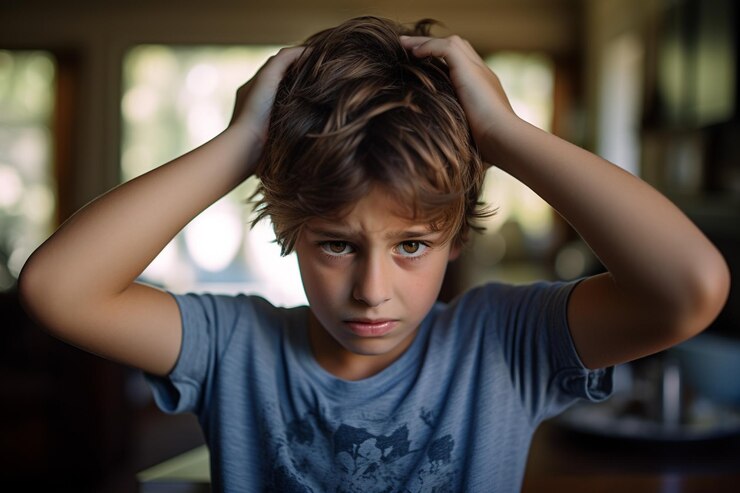7 Effective Ways to Help Anxious Children Overcome Their Worries
 Discover 7 practical strategies to support anxious children in conquering their fears and building resilience effectively.
Discover 7 practical strategies to support anxious children in conquering their fears and building resilience effectively.
Understanding childhood anxiety
Anxiety is a natural response to stress or danger, but for some children, it can become overwhelming and interfere with their daily functioning. It’s important to recognize that anxiety disorders in children are real and can have a significant impact on their lives. Understanding the nature of childhood anxiety involves recognizing its various forms, such as generalized anxiety disorder, separation anxiety disorder, social anxiety disorder, and specific phobias. Each type may manifest differently in children, but they all share the common feature of excessive and persistent worry or fear that is disproportionate to the actual threat.
The impact of anxiety on children
Anxiety can have far-reaching effects on children’s lives, impacting their emotional well-being, academic performance, social interactions, and physical health. Persistent anxiety can lead to difficulties concentrating, sleeping problems, irritability, avoidance of social situations or school, and even physical symptoms such as headaches or stomachaches. Left unaddressed, childhood anxiety can also increase the risk of developing other mental health issues later in life. Therefore, it’s crucial to address anxiety in children promptly and effectively.
 Identifying signs of anxiety in children
Identifying signs of anxiety in children
Recognizing the signs of anxiety in children is the first step in providing them with the support they need. Symptoms of anxiety in children may vary depending on the individual and the type of anxiety disorder they’re experiencing. Common signs include excessive worrying, restlessness, difficulty concentrating, irritability, muscle tension, fatigue, and avoidance of certain activities or situations. Parents and caregivers should pay attention to changes in behavior or mood that persist over time and interfere with the child’s daily life.
Effective ways to help anxious children
Supporting anxious children requires a multi-faceted approach that addresses their emotional, physical, and psychological needs. Here are seven effective strategies to help anxious children overcome their worries:
Encouraging open communication
Creating a safe and non-judgmental environment for children to express their fears and concerns is essential. Encourage them to talk about their feelings openly and validate their experiences. Listening attentively and empathetically can help children feel understood and supported, fostering trust and strengthening the parent-child bond.
Teaching relaxation techniques
Relaxation techniques such as deep breathing exercises, mindfulness, and progressive muscle relaxation can help anxious children manage their stress levels and promote a sense of calm. These techniques empower children to regulate their emotions and cope effectively with anxiety-provoking situations.
Promoting healthy lifestyle habits
Encouraging regular physical activity, adequate sleep, and a balanced diet can significantly impact children’s overall well-being and resilience to stress. Physical activity serves as a natural outlet for pent-up energy and tension, while proper nutrition and sleep support cognitive function and emotional regulation.
 Seeking professional help for childhood anxiety
Seeking professional help for childhood anxiety
If a child’s anxiety persists or significantly interferes with their daily life, seeking professional help from a therapist or counselor specializing in anxiety disorders is crucial. A mental health professional can conduct a comprehensive assessment, provide evidence-based interventions, and offer support to both the child and their family.
Supporting anxious children at school
Collaborating with teachers and school personnel to create a supportive environment for anxious children is essential. Educators can implement accommodations such as modified assignments, flexible seating arrangements, or designated quiet spaces to help alleviate stress and facilitate learning.
Conclusion: 7 Effective Ways to Help Anxious Children Overcome Their Worries
Childhood anxiety is a prevalent and serious issue that requires attention and support from parents, caregivers, educators, and mental health professionals. By understanding the nature of anxiety in children, identifying signs of anxiety, and implementing effective strategies to support anxious children, we can help them overcome their worries and thrive. Encouraging open communication, teaching relaxation techniques, promoting healthy lifestyle habits, seeking professional help when needed, and supporting anxious children at school are essential steps in nurturing their emotional well-being and resilience. Together, we can create a supportive environment where anxious children feel empowered to navigate life with confidence and optimism.
Learn more about Help Anxious Children on our YouTube channel.
#childhoodanxiety #supportanxiouschildren #socialanxietydisorder #helpanxiouschildren




